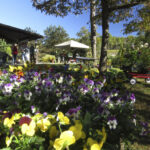Submitted
In the ever-changing world of economic development, it is imperative that communities in East Tennessee recognize the paradigm shift that is happening nationally in regards to enhanced community character, retail, real estate, and economic changes. In an effort to foster change and growth all around our beautiful region, ETCompetes!—in conjunction with their partners East Tennessee Quality Growth, NAI, US Bank, and University of Tennessee School of Landscape Architecture—are sponsoring two workshops featuring nationally recognized speaker, Ed McMahon, Urban Land Institute senior resident fellow.
McMahon spent 14 years as the vice president and director of land use planning for the Conservation Fund in Arlington, Va., where he helped protect more than five million acres of land that has historic or natural significance. McMahon is also the cofounder and former president of Scenic America, a national nonprofit organization devoted to protecting America’s scenic landscapes.
McMahon will be discussing how to build a prosperous community, and how leaders can take inventory of their community’s assets and incorporate those into a vision, and he will present the “Seven Secrets of Successful Communities.” From community leaders to committed citizens in our region, we urge you to attend this free event and take information back to your community on how to grow and prosper in the future.
“Secrets of Successful Communities” will be offered on March 26 and March 27. The Wednesday, March 26, event will take place at McCarty Auditorium Room on the UT campus from 5-6:30 p.m. EDT. The Thursday, March 27, event will take place at the East Tennessee History Center in Knoxville from 10:30 a.m.–12 p.m. EDT. To register for either event, contact Julie Graham at Julie.etqg@gmail.com or Dori Caron at dori.caron@knoxmpc.org.
ETQG is a 501c(3) organization incorporated in 2009 that seeks to serve the people of the 16 counties comprising the East Tennessee Development District. Headquartered in Knoxville, the organization works to cultivate a regional voice through dialogue at the local level, build a regional understanding of quality growth and desired actions, facilitate collaboration and action, and to form a sustainable network of technical support resources for local decision makers and citizens. The board of directors is comprised of leaders in government, education, business, industry, and environmental organizations from all of the represented counties.









Leave a Reply